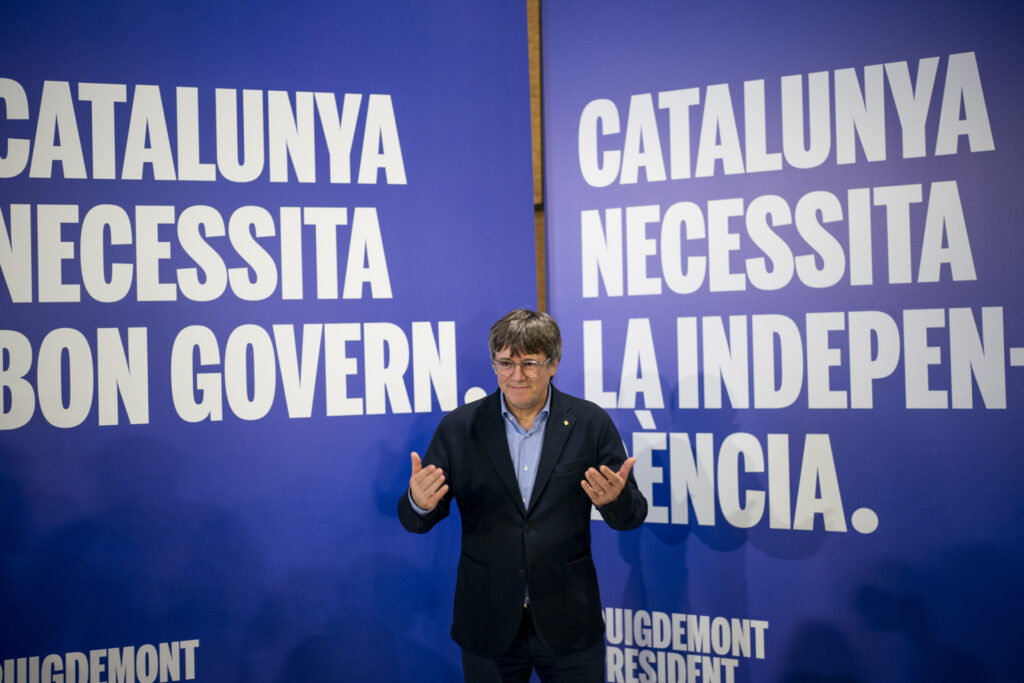The Spanish Supreme Court ruled on Monday the nation’s Parliament did not have the power to pass an amnesty for Carles Puigdemont, the exiled head of the Catalan separatist movement, and several of his top aides facing criminal charges for misappropriating public funds.
Puigdemont, who leads the Catalan political party Junts as a fugitive in France, organized a referendum in 2017 asking Catalans if they would like to secede from Spain. Voters overwhelmingly supported secession, but the Spanish government ruled the referendum was illegal and has since ignored it. The controversy resulted in an outbreak of violence in Catalonia and mass arrests of rioters on charges of disorderly conduct, terrorism, and other crimes.
The referendum remains relevant today because socialist Spanish Prime Minister Pedro Sánchez, failing to obtain sufficient seats in Parliament to keep his position last year, brokered a deal offering amnesty to those facing charges related to the secessionist movement with Junts and the Republican Left of Catalonia (ERC) in exchange for the two parties supporting the ongoing rule of Sánchez’s Socialist Workers’ Party of Spain (PSOE). The amnesty would have affected hundreds of people facing charges. The deal prompted widespread outrage in Spain in November, resulting in millions of Spaniards, led by the right-wing Vox Party and the centrist Popular Party (PP), taking the streets denouncing the amnesty agreement as a “coup.”
Junts has already at least once threatened to abandon the agreement – which would result in the collapse of the PSOE government – because the proposed amnesties were not sufficient. It remains unclear at press time if Junts and ERC will abandon the coalition in response to the Supreme Court ruling.

Former regional president Carles Puigdemont poses for a photo during a campaign rally in Argelers, France, Wednesday, May 8, 2024. About 6 million Catalans are casting ballots in a regional election that will test if Catalonia wants pro-independence leader Carles Puigdemont back or if the wealthy region has moved on to more pressing worries. (AP Photo/Joan Mateu)
The Supreme Court case concluded on Monday pertained to the criminal charges that Puigdemont is facing personally, as well as aides Toni Comín and Lluís Puig, for alleged embezzlement. Puigdemont stands accused of using public funds illicitly to organize and execute the illegal referendum. He would have received amnesty following the passage of a law in May to clear the records of separatists involved in the 2017 secession effort.
The Court ruled that the law’s exemption for cases involving European Union finances, not just Spanish government money, would apply to Puigdemont, because taking money from Spanish coffers would necessarily affect E.U. finances. In a scathing 98-page ruling, the Court argued that offering Puigdemont and his associates amnesty would significantly erode the rule of law in Spain and threaten the integrity of the European Union. The conservative Spanish outlet Libertad Digital described the ruling as a “death blow” to the amnesty deal generally.
“The weakening of the territorial strength of Spain and the European Union itself was real,” the Supreme Court declared, referring to the 2017 referendum. “The structural bases over which the European project was erected were put at risk.”

File/Demonstrators hold a poster of former Catalan regional president Carles Puigdemont outside the European Parliament in Strasbourg, eastern France, on July 2, 2019. (AP Photo/Jean-Francois Badias, File)
“It is immaterial that the objective to this effect was not achieved,” the ruling continued, “as it would be if embezzlement for clearly particular purposes – think of the acquisition of a property – had remained an attempt. It is the potential to harm financial interests that excludes conduct from benefit, not the actual harm.”
To offer the Catalan leaders amnesty, the court asserted, would “create a parenthetical before 100 years of jurisprudence and do it for very concrete acts and protagonists – a parenthetical that would then be closed for all other citizens who have been condemned for a crime of the same nature.”
Conservatives in the country responded positively to the ruling. The head of the Vox political party, Santiago Abascal, issued a brief statement on social media: “a little bit of decency amid so much disgrace.”
Puigdemont and his associates are expected to appeal the ruling before the nation’s Constitutional Court, which operates separately from the Supreme Court, but the ruling will necessarily deeply impact the PSOE’s ability to deliver on its coalition promises in at least the short term.
That coalition was built after months of failed attempts to form a government by both the PSOE and PP after no political party received a majority in the national legislative elections in August. While Vox and several other smaller parties made significant gains, the erosion of support for the two largest parties required a coalition to form a government to avoid another round of voting.
Sánchez announced a plan to offer amnesty to Catalan separatists in October, about a month before the deadline for a new election. The deal prompted nationwide protests, the largest attracting 3 million people across Spain, accusing Sánchez of attempting a “coup d’etat” to stay in power despite being voted out.
“There are many of us who believe that he [Sánchez] is attempting a coup d’etat and that, therefore, a permanent and peaceful mobilization must respond,” Abascal, the head of Vox, told reporters at the time.
Spanish lawmakers took nearly six months to draft an amnesty bill, a precarious process in which Junts quit in January because the draft legislation did not protect the separatists enough from prosecution. Junts ultimately stayed in the coalition and signed onto the legislation passed in May, which the Supreme Court just ruled did not apply to the most powerful people in the Catalan separatist movement.

COMMENTS
Please let us know if you're having issues with commenting.